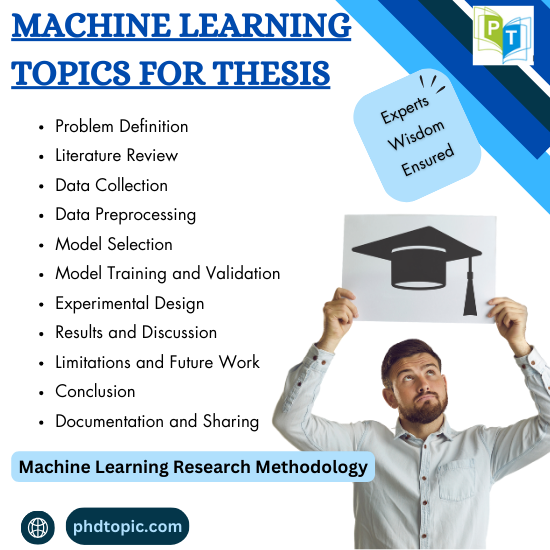Aspiring machine learning writers in phdtopic.com will, carry on complete literature survey and find research gap by sharing novel topics on your area. More than 8000+scholars have successfully completed their research work by working with us you can get to know the quality of four work by working with us. Our research method in the context of a machine learning (ML) project is a model that overviews how our research is to be conducted, including the processes, methods, tools and data analysis methods that will be utilized. Here, we give a detailed breakdown of the key components that could form a part of a machine learning research methodology:
- Problem Definition:
- Problem Statement: We clearly define the issue that you are trying to solve with the machine learning methods.
- Research Questions: Our research goals to answer the pose particular questions.
- Hypotheses: To test through our investigation, we formulate hypotheses.
- Literature Review:
- Existing Solutions: In our work we address the issues, by survey present techniques or frameworks.
- Theory and Background: For our problem field it is essential to interpret the theoretical background.
- Data Collection:
- Data Sources: From where we will gather our data, we find the sources
- Data Sampling: To make sure of the representativeness of the data, we overview the sampling frameworks.
- Data Privacy and Ethics: With data security laws and ethical guidelines, we make sure that compliance.
- Data Preprocessing:
- Data Cleaning: Our work handles missing data, noise and outliers to define the frameworks.
- Feature Selection/Extraction: To decrease dimensionality or extracting novel features we detail the utilized methods.
- Data Transformation: Normalization or encoding is a data transformation technique that defines any changes that are applied to the data.
- Model Selection:
- Algorithm Selection: We utilize machine learning methods to rationalize the selection process.
- Baseline Models: For comparing more complicated techniques, we create baseline frameworks.
- Model Training and Validation:
- Training Process: Any cross validation method will be involved to overview how our frameworks will be trained.
- Hyperparameter Tuning: For optimizing the framework parameters, we define the approach.
- Model Evaluation Metrics: On the basis of problem type (Classification, Regression, Clustering, etc.) we choose relevant metrics to estimate the model achievement.
- Experimental Design:
- Test Bed: By setting up the surroundings, we carry out the experiments.
- Reproducibility: By offering detailed settings and random seed information, we make sure that our experiments can be regenerated.
- Statistical Tests: To Compare the frameworks or estimate findings, our work specifies any statistical tests.
- Results and Discussion:
- Performance Analysis: From various frameworks, we present and converse the findings we gained.
- Impact of Findings: In our work, we identify the suggestions that converse the context of the issue field.
- Comparison with state-of-the-Art: With the present state-of-the-art solutions, we compare our findings.
- Limitations and Future Work:
- Limitations: The limitations of our study and possible sources of bias will be recognized.
- Future Directions: In future repetition, we propose the region for further research or enhancements.
- Conclusions:
- Summary: Our research outlines the main results and contributions.
- Takeaways: From our study we provide key takeaways that involve practical applications if relevant.
- Documentation and Sharing:
- Code and Data Sharing: Our work converse how the code and datasets (if sharable) will be prepared vacant for others.
- Publications: We publish or disseminate our research results by overviewing the plan.
- Ethics and Social Impact:
- Ethical Considerations: We address any ethical concerns that are appropriate to our research.
- Societal Impact: We converse about the possible influence of our ML applications on society.
Our research approach will serve as a complete plan that guides our research activities. To make sure the validity and reliability of our findings, it is essential that it is well-structured, systematic and rigorous. During the research process, it will be flexible enough to adjust any unforeseen difficulty that arises.
Machine Learning Topics for Thesis
We have curated a list of innovative and interesting Machine Learning Topics for Thesis read it an explore more by getting our services.
- TC and PPGL Detection Based on Machine Learning Models
- ACCLAiM: Advancing the Practicality of MPI Collective Communication Autotuning Using Machine Learning
- Securing virtual execution environments through machine learning-based intrusion detection
- Improved Extreme Learning Machine Based on Deep Learning and Its Application in Handwritten Digits Recognition
- An E-Learning System with Multifacial Emotion Recognition Using Supervised Machine Learning
- Research and Application of Different Machine Learning Algorithms in ILPD Risk Prediction Model
- Design of Human-computer Interaction System Using Gesture Recognition Algorithm from the Perspective of Machine Learning
- Bluetooth Based Indoor Positioning Using Machine Learning Algorithms
- Feature expansion of single dimensional time series data for machine learning classification
- Smart equipment failure detection with machine learning applied to thermography inspection data in modern power systems
- Password Strength Analysis and its Classification by Applying Machine Learning Based Techniques
- A Machine Learning based Facial Expression and Emotion Recognition for Human Computer Interaction through Fuzzy Logic System
- Pothole Detection Using Machine Learning Algorithms
- Machine Learning to optimize Permanent Magnet Synchronous Machines
- Fast HEVC intra coding algorithm based on machine learning and Laplacian Transparent Composite Model
- Machine Learning for Optimum CT-Prediction for qPCR
- Machine Learning Techniques Applied to Sensor Data Correction in Building Technologies
- Activity Recognition and Localization based on UWB Indoor Positioning System and Machine Learning
- Proposed machine learning system to predict and estimate impulse noise in OFDM communication system
- Fast Extraction of Per-Unit-Length Parameters of Hybrid Copper-Graphene Interconnects via Generalized Knowledge Based Machine Learning

